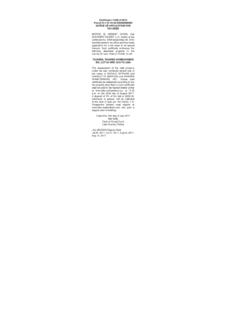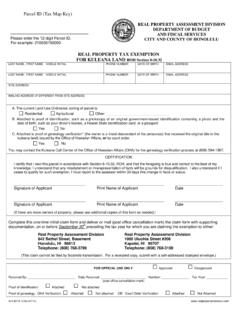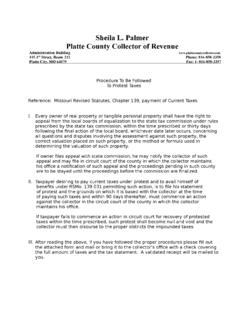Transcription of Understanding Your Avitar Property Record Card
1 Avitar Understanding your Property Record CARD & Avitar CAMA SYSTEM APPRAISAL CARD - FRONT SIDE As you can see, the appraisal card is broken into sections. 1) MAP/LOT/SUB - Numbers represent the parcel identification numbers (PID) used by the town. The map number represents the ID of the map sheet on which the parcel is displayed. The lot number and sub lot are the unique ID for the parcel on that map sheet. 2) CARD # OF # - Typically 1 of 1 means the parcel has only one assessment Record card for its entire assessment information. In a multi-card situation, where more than one assessment Record card is needed to show the assessment information of a parcel with several primary buildings, the first number is the sequential card number and the second number is the total number of cards for that parcel.
2 3) PRINTED - The date the card was printed, reflecting the assessment information and value on file at that time. 4) OWNER INFORMATION - Located in upper left hand corner just below map-lot-sublot numbers and contains the owner name and address information of Record at the time of print. 5) SALE HISTORY - This section is located to the right of owner information box and displays the five most current sales recorded as known for this parcel, showing book, page, date, type of sale (Qualified/Unqualified & Vacant/Improved) and seller s name. 6) LISTING HISTORY - This section usually contains the date that the Property was visited, plus the two initials of the person who visited the Property . The third character is the reason why they were there, and the fourth is the action taken.
3 This may vary as it is user definable, but will always have a date followed by a four space code and then space for a brief note. 7) NOTES - An area for the appraiser to enter abbreviated notes about the Property , as well as reasons for any adjustments made elsewhere on the assessment Record card. 8) PICTURE - Intended to represent some aspect of this tract of land such as view, waterfront or site or outbuildings. 9) EXTRA FEATURES VALUATION - This area contains the valuation of fireplaces, pools, sheds, detached garages, etc., and displays a description (as well as dimensions when appropriate), the unit rate, condition and final value. The grand total is rounded to nearest $100. Also included, is a brief notes section for each extra feature item listed. 10) VALUE SUMMARY (BASE YEAR) - Is located about half way down the right side of the card and displays the prior year and current assessed value summarized as buildings, features and land and then the card total value.
4 In the case of a multi-card parcel, in the current year column an additional value will be displayed for the total parcel value just below the card total value, whereas the prior year values will only show the total assessed value of the entire parcel. The base year is the year of the last valuation update and the year from which the age depreciation of the building is computed. 11) LAND VALUATION - This area provides all the information necessary for land valuation. Zone - Displays the land pricing table description, which is usually the same as the zones in town. Minimum Acreage - The minimum lot size as defined by zoning requirements of the town. Occasionally, zones are defined that do not relate to the town zoning. Minimum Frontage - Same as above, but represents the minimum required road frontage needed for development.
5 Site - A brief description of the site such as undeveloped, fair, average, good, very good or excellent referring to the condition of the site development and landscaping. Road - A brief description of the road such as paved or gravel. Driveway - A brief description of the driveway such as none, gravel, paved, stone, etc. Land Type - Refers to specific codes used to classify land use. Units - Size of land being assessed on each line. AC = Acres FF = Front Feet (Road Frontage) WF = Waterfront Feet VU = View SF = Square Feet Base Rate - Dollar value per unit, except on line one where it is the basic value of the building site, if one exists, for the lot size shown under units. NC - Neighborhood Code. All towns have distinct neighborhoods, some more than others, which influence value based on features of the neighborhood and market desirability.
6 Neighborhoods are represented alphabetically with E being average; A, B, C & D being levels below average; and F, G, H, I, etc. being levels above average value and desirability. ADJ - The factor by which the neighborhood influences the value. In the case of excess acreage, it is a quantity or size adjustment factor Site - Land line one only and displays the adjustment factor, if any, associated with the description. Dway - Land line one only and displays the adjustment factor, if any, associated with the description. Road - A brief description of the road such as paved or gravel. Topography - Each land line can have a topography description and adjustment associated and displayed with it. Cond - Condition - area to enter other land adjustments, such as: wet, shape, undeveloped, etc.
7 Ad Valorem - Market value. SPI - Soil Potential Index is used to regulate the per acre rate of the current use land based on the range of value provided by the state. An entry of 100 means the maximum value and 0 means the minimum. The SPI is provided by the landowner for farm land. R - This is used for the current use recreation discount. If the recreation discount is granted, a Y will appear in this column. Tax Value - Is the taxable value of all land being appraised, including the land assessed under current use. Notes - Brief information about each land line or the COND adjustment. APPRAISAL CARD - BACK SIDE 1) PERMITS - Area to keep track of issued building permits, manually or automatically from the Avitar Building Permit module, if your town building inspector is using that module.
8 2) OWNER INFORMATION - Repeats the owner information from the front for ease of use. 3) BUILDING DESCRIPTION - The title bar displays the story height, building style and year built. Roof - Style & Material Cover Bedrooms - # of Bedrooms Ext - Exterior Wall Cover Bath - # of Baths Int - Interior Wall Material Fixtures - Total # of Bath Fixtures Floor - Floor Cover Material A/C - Central Air Heat - Type & Fuel Base Rate - Bldg Sq Ft Cost Quality - Building Quality Description Bldg Rate - Overall bldg factor, based on prior bldg description Com Wall - Commercial Wall Structure Com Wall Fctr - Commercial Wall Adj Size Adj - Size Adj Factor Adjusted Base Rate - Final Adjusted Bld Sq Ft Cost 4) BUILDING SKETCH - It is the area in which the CAMA generated sketch can be found.
9 Labeling of all sections is located within each area. The acronyms in the sketch, which consists of three letters are shown to the right of the sketch in the Building Sub Area Details section in a more readable, but still in an abbreviated format. 5) TAXABLE DISTRICTS - This area lists any town districts and the percentage of the Property in each district. 6) BUILDING SUB AREA DETAILS - This shows the Sub Area ID and description, the actual area for each sub area, the cost factor associated with it as a percentage of the Building Square Foot Cost and the effective area, which is the actual area time the cost factor. Example: A first floor finished (FFF) might be worth $86/sq ft, but an attached deck would not be. By using the 10% cost factor, the square foot cost of the deck would be $ So, if you have a 100 square foot deck at $ , it would be valued at $860.
10 Put another way, 100 sf times cost adjustment factor of 10% = 10 sf. 10 sf * $86 base rate = $860. As you can see, using the adjustment this way is the same, but it enables the computation of the total effective area for use in the overall size adjustment computation and for comparing the effective area of comparable structures. 7) Building Market Cost New/Depreciation - Is calculated at by multiplying the total effective area by the Building Adjusted Base Rate, displayed just above and to the right of the sketch. This represents the undepreciated value of the structure, or rather the cost to replace the structure with a similar structure at the time the assessment was made, based on the local market data. Normal - Deprecation based on the age and condition of the building.



